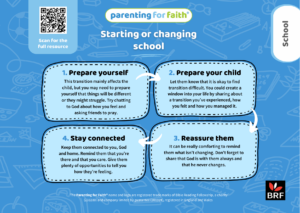Transitions
How do we help our children with change, whether that's leaving home, a new school, new house or new member of the family?
Growing up inevitably involves change but sometimes we don’t find it easy to manage. Here are some ideas to help you and your child journey through a transition together, whether that’s starting work, moving schools, moving house or another change of circumstances. We’ve also got a postcard download that you can print out and stick on the fridge or save onto your phone to refer to. You can use this tool in children’s and youth groups as well as at home, so feel free to share it in your churches too.
1. Prepare yourself
Even if the change or transition primarily affects the child, you need to prepare yourself that there may be some unusual or more challenging behaviour as they work through it and that can be tough on you. They might sail through it, which is wonderful but if they don’t that’s very normal too and you need to make sure you’re getting the support you need. You could try:
- Chatting to God about how you’re doing. Whether that’s just in your head or by scribbling or typing something in a journal. If they’re off to uni or leaving home, you’ll need to make the transition of not being able to see for yourself how they’re doing. This is a great time to really pray and learn to trust God that He’s looking after them.
- Getting some friends lined up to pray. Let them know if there are key dates that might be tricky or send a quick text if there’s a particular struggle they can pray into. If it’s your child’s first day at a new school you might want to arrange to meet up with a friend or other parents after drop off.
2. Prepare your child
Let them know in advance that it is okay to find transition difficult. Be open and start the conversation early if you can.
You could create a window into your life by sharing about a transition you’ve experienced, how you felt and how you managed it. You could also use examples of friends and family or Biblical characters who experienced change. What about reading the story of Abraham moving to a different country? You could wonder together about how he felt and how he kept trusting that God was with him even when everything was unfamiliar.
Make sure they know what is going to happen. Younger children or those with additional needs might benefit from a visual timetable or pictures or steps that they can look at. For teens leaving home, you might want to decide together in advance how long you’ll stay when you drop them off or how long it’ll be before they make a trip home.
3. Reassure them of what is the same
In the midst of change, it can be really comforting to remember what isn’t changing. This can be the big things, like how much you love them and also the smaller practical details, like that someone will still always be there to collect them or that they can call home whenever they need to.
Don’t forget to share that God is with them always and that He never changes. You could listen to or learn a memory verse song (plenty on YouTube – try searching Seeds Family Worship or DumbRocks) or catch together and ask God to give them a picture, word or Bible verse to remind them that He’s there. For my daughter starting preschool, God showed her a picture of my parents’ cat. When we asked God why, she said it was because he went off and had amazing adventures but always came back to his safe home and grown ups afterwards. We were able to remind her of that picture when she was feeling wobbly about being away from us.
Also, for the things that you have control over, try to keep to the usual routine as much as possible. So if school’s all new, now probably isn’t a great time to swap bedrooms and push their dinner an hour later.
4. Stay connected
Keep them connected to you, to God and to home. Whether that’s allowing them to take a comfort blanket, photo or favourite teddy in their bag, a post it in their lunchbox or a quick midday text. If they’ve left home, pop a card in the post and arrange a visit or a set time that you’ll call. Remind them that you’re there and that you care.
Give them plenty of opportunities to tell you how they’re feeling. You might need to name the feelings they don’t have words for, you could try saying something like ‘I wonder if moving up day feels a bit scary’. You can use chat and catch to help them share with God how they’re doing too. You could use prompts like:
- Tell God what you’ll miss most about your old school.
- Share with Him what you’re most excited and most worried about for your first day at your new school
- Ask him for an idea of what to do if you’re feeling alone or not sure what to do
- Ask him if there’s anyone he wants you to especially look out for

If they’re having a particularly rough day or struggling to connect with God, you can use the steps from Session 7: Prayer ministry with children to help them reconnect with him. Don’t forget you can do this over a WhatsApp call, or Messenger or simply a phone call; prayer doesn’t have to be in person.
And remember, change is inevitable… except from a vending machine! As you walk through this transition with them, you’re not only helping them with what they’re facing right now but you’re giving them tools and skills for tackling other changes and transitions that’ll happen throughout their life.

